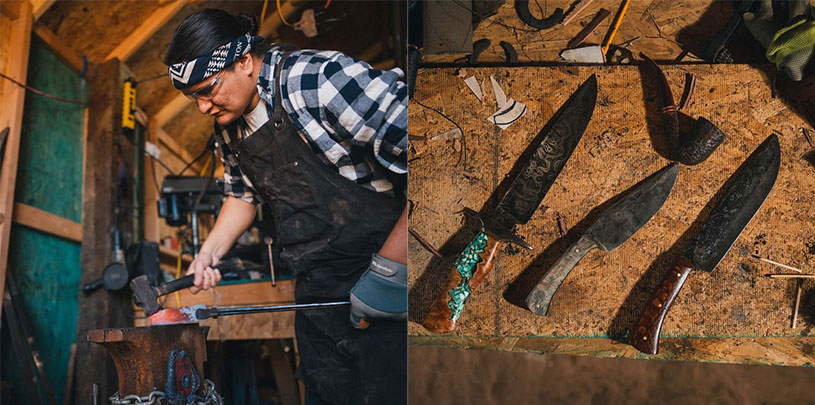
Guest post by Change Labs
The Grand Canyon Trust is proud to partner with Change Labs to help entrepreneurs realize their dreams and build a strong, resilient, and culturally respectful economy across Native America.
In a ditch on the Navajo Nation, Cody Artis and his cousins played with wooden swords and pretended to save fantasy worlds.
As he grew up, his interest in swords became more than fantasy play and his fascination with the swords he saw in movies took over.
One scene that always stood out to him was the sword forging scene in the movie “Conan the Barbarian.” When he saw that, it was something he knew he wanted to do.
Artis has been forging knives since 2017 and owns Artis Forge, a business dedicated to knives that range from kitchen cutlery to knives for hunting and butchering. His business is located on the Navajo Nation in Breadsprings, New Mexico.
“I find a sense of freedom and creativity on the reservation,” he said. Artis likes having a business near his family and because forging can be loud, he said the ruralness of the reservation allows him to conduct business without bothering any neighbors.
He is self- taught and gives his mom all the credit. She was a painter, beader, seamstress, Kachina carver and overall carpenter. It’s how she made money and how she raised him.
“I would just sit with her,” he said, adding that’s how he learned.“By the time I started getting older, I became more crafty in what I wanted to do. I was able to apply that thirst for knowledge.”
When he’s working on a knife, he’s bringing in years of experience, years of trial and error, as well as his time and knowledge of how to hammer the steel or how to shape the knife.
“When I come out of it, I put about 24 hours into one knife,” he said.
While Artis accounts for all of these factors in his prices, he does run into customers who think his prices are too high. He’s been told how much his work should cost and while he understands that not everyone sees the price value the same, he hopes people see that his work is art.
“I think a lot of people don’t understand the whole process that goes into creating something that you’re going to be passing down for generations or utilizing out on the rez,” he said. “I think people don’t understand the value that is not monetary.”
 WADE ADAKAI
WADE ADAKAI
The value of a knife that doesn’t dull, that stays sharp and one that can break the backbone of sheep and is good quality for butchering that will last for years, he said.
“You can go and buy any knife, you can go buy a knife from Wal-Mart,” he said. “But some people love the fact that (my) knives are hand forged, made by me, made by a Navajo.”
He looks at his knives as an artform, it’s like buying a squash blossom necklace, he said, it takes time and he wants people to be proud to use his product.
But Artis didn’t always have this confidence in his work. He struggled at first. When he finished college he was lost. He found himself unemployed and not knowing what was supposed to come next.
“I was down and out and I said, ‘ok, I’m going to learn something,’” he said.
He started watching forging videos, bought his first piece of steel and made his first forge by rigging his own contraption using an old charcoal grill, some horse manure and an altered air mattress pump. His father helped him obtain well needed shop equipment and supplies.
“I did everything with the bare minimum,” he said. “Now I have my own shop, a really nice grinders, a heat treat oven, anvil, a nice forge and all these nice things that I’ve been working my butt off for.”
Artis encourages everyone who has a dream of working on their craft to never give up and to keep working even when they don’t have all the tools they need. He also encourages everyone to express and expand themselves whether its through creating or knowledge.
This blog is reprinted with permission from Change Labs. Read the original post and learn more ›
First-generation jeweler Thomas Deel is back at his jeweler's bench crafting statement pieces out of silver, turquoise, coral, and gold.
Read MoreSummer and LaMandez Brown knew there weren't a lot of jobs on the Navajo reservation. So they made their own.
Read MoreMarisa Mike, a Diné fashion designer, combines traditional styles with contemporary twists in her line of special-occasion wear.
Read More